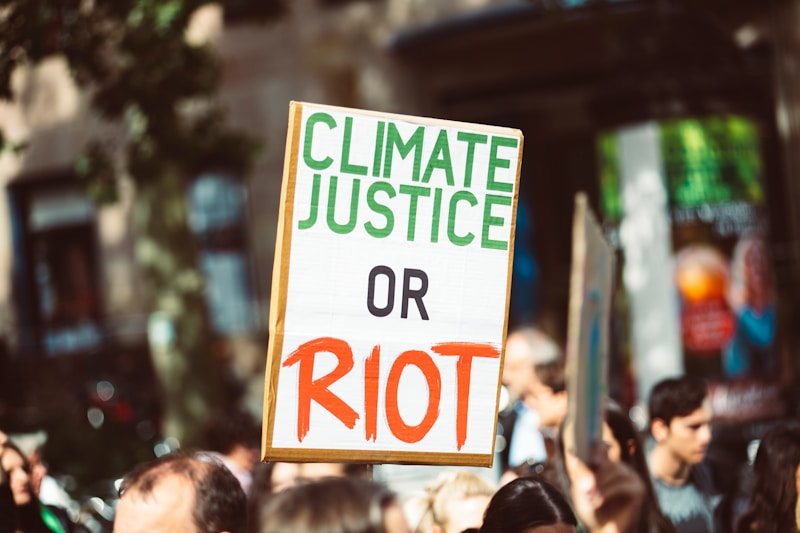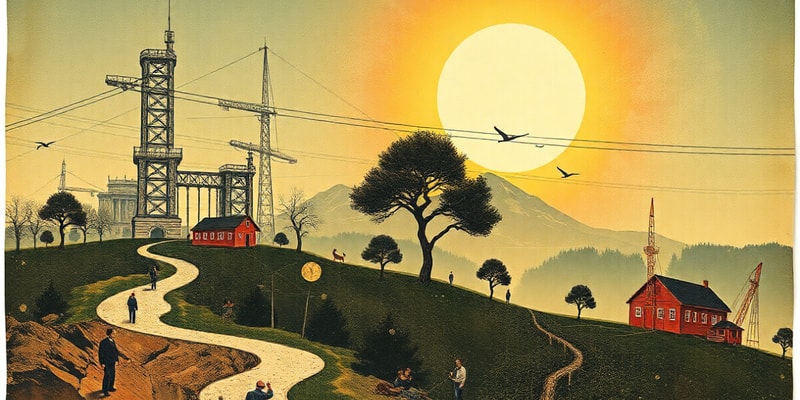Podcast
Questions and Answers
Which greenhouse gas is the largest overall contributor to the greenhouse effect?
Which greenhouse gas is the largest overall contributor to the greenhouse effect?
How does an increase in carbon dioxide affect water vapour in the atmosphere?
How does an increase in carbon dioxide affect water vapour in the atmosphere?
What are some human-related sources of carbon dioxide emissions?
What are some human-related sources of carbon dioxide emissions?
Which factor is NOT directly caused by an increase in carbon dioxide levels in the atmosphere?
Which factor is NOT directly caused by an increase in carbon dioxide levels in the atmosphere?
Signup and view all the answers
What process contributes to the alteration of the carbon cycle due to human activities?
What process contributes to the alteration of the carbon cycle due to human activities?
Signup and view all the answers
Which of the following is a result of increased greenhouse gases in the atmosphere?
Which of the following is a result of increased greenhouse gases in the atmosphere?
Signup and view all the answers
What is one of the significant ways carbon dioxide is emitted through industrial processes?
What is one of the significant ways carbon dioxide is emitted through industrial processes?
Signup and view all the answers
Why does water vapour cycle through the atmosphere more quickly than carbon dioxide?
Why does water vapour cycle through the atmosphere more quickly than carbon dioxide?
Signup and view all the answers
What primarily distinguishes climate change from short-term weather variations?
What primarily distinguishes climate change from short-term weather variations?
Signup and view all the answers
Which of the following human activities is a significant contributor to climate change?
Which of the following human activities is a significant contributor to climate change?
Signup and view all the answers
What is primarily meant by the phrase "global warming" in common usage?
What is primarily meant by the phrase "global warming" in common usage?
Signup and view all the answers
Which factor is NOT a natural cause of climate change mentioned in the content?
Which factor is NOT a natural cause of climate change mentioned in the content?
Signup and view all the answers
What is necessary for climate change to be attributed to human activity?
What is necessary for climate change to be attributed to human activity?
Signup and view all the answers
Which of the following is an example of climate change observed over the last century?
Which of the following is an example of climate change observed over the last century?
Signup and view all the answers
Which event is NOT typically attributed to climate change?
Which event is NOT typically attributed to climate change?
Signup and view all the answers
What is a measurable effect of the continual warming trend related to climate change?
What is a measurable effect of the continual warming trend related to climate change?
Signup and view all the answers
What is considered the most effective way to reduce carbon dioxide emissions?
What is considered the most effective way to reduce carbon dioxide emissions?
Signup and view all the answers
Which factor is NOT mentioned as influencing changes in CO₂ emissions from fossil fuel combustion?
Which factor is NOT mentioned as influencing changes in CO₂ emissions from fossil fuel combustion?
Signup and view all the answers
Which of the following is the primary source of methane (CH₄) emissions globally?
Which of the following is the primary source of methane (CH₄) emissions globally?
Signup and view all the answers
Which human activity contributes to methane emissions through waste management?
Which human activity contributes to methane emissions through waste management?
Signup and view all the answers
Which country is currently the second largest emitter of greenhouse gases?
Which country is currently the second largest emitter of greenhouse gases?
Signup and view all the answers
What is a major natural source of methane emissions?
What is a major natural source of methane emissions?
Signup and view all the answers
What is the main reason the USA's withdrawal from climate initiatives could impact global GHG emissions control?
What is the main reason the USA's withdrawal from climate initiatives could impact global GHG emissions control?
Signup and view all the answers
Which one of these options is NOT a strategy for reducing CO₂ emissions?
Which one of these options is NOT a strategy for reducing CO₂ emissions?
Signup and view all the answers
What is considered a significant human activity that contributes to the increase of nitrous oxide in the atmosphere?
What is considered a significant human activity that contributes to the increase of nitrous oxide in the atmosphere?
Signup and view all the answers
Which of the following is NOT a natural source of nitrous oxide emissions?
Which of the following is NOT a natural source of nitrous oxide emissions?
Signup and view all the answers
Fluorinated gases are characterized by their:
Fluorinated gases are characterized by their:
Signup and view all the answers
Which industrial process is a source of nitrous oxide through the production of a specific acid?
Which industrial process is a source of nitrous oxide through the production of a specific acid?
Signup and view all the answers
What method is NOT effective in removing nitrous oxide from the atmosphere?
What method is NOT effective in removing nitrous oxide from the atmosphere?
Signup and view all the answers
Which type of fluorinated gas is primarily used as refrigerants and fire retardants?
Which type of fluorinated gas is primarily used as refrigerants and fire retardants?
Signup and view all the answers
What is one way fluorinated gases are removed from the atmosphere?
What is one way fluorinated gases are removed from the atmosphere?
Signup and view all the answers
Which of the following statements about nitrous oxide is true?
Which of the following statements about nitrous oxide is true?
Signup and view all the answers
What is the primary environmental concern associated with the use of HFCs?
What is the primary environmental concern associated with the use of HFCs?
Signup and view all the answers
Which chemical is specifically used in semiconductor manufacturing and magnesium processing?
Which chemical is specifically used in semiconductor manufacturing and magnesium processing?
Signup and view all the answers
Black carbon primarily contributes to atmospheric warming through which mechanism?
Black carbon primarily contributes to atmospheric warming through which mechanism?
Signup and view all the answers
How long does black carbon typically remain in the atmosphere?
How long does black carbon typically remain in the atmosphere?
Signup and view all the answers
What is one consequence of black carbon deposition on snow and ice?
What is one consequence of black carbon deposition on snow and ice?
Signup and view all the answers
Which of the following is a byproduct of HCFC-22 production?
Which of the following is a byproduct of HCFC-22 production?
Signup and view all the answers
What impact does black carbon have on monsoon rainfall patterns?
What impact does black carbon have on monsoon rainfall patterns?
Signup and view all the answers
Which process contributes to the emissions of black carbon?
Which process contributes to the emissions of black carbon?
Signup and view all the answers
Which gas has the highest Global Warming Potential (GWP) over a 100-year period?
Which gas has the highest Global Warming Potential (GWP) over a 100-year period?
Signup and view all the answers
What is the average lifetime of methane in the atmosphere?
What is the average lifetime of methane in the atmosphere?
Signup and view all the answers
Which greenhouse gas has a GWP of 310 times that of carbon dioxide?
Which greenhouse gas has a GWP of 310 times that of carbon dioxide?
Signup and view all the answers
Which of these gases is categorized as having a variable GWP ranging from 140 to 11,700?
Which of these gases is categorized as having a variable GWP ranging from 140 to 11,700?
Signup and view all the answers
What effect do aerosols generally have on climate?
What effect do aerosols generally have on climate?
Signup and view all the answers
What is the baseline Global Warming Potential (GWP) value used for comparison?
What is the baseline Global Warming Potential (GWP) value used for comparison?
Signup and view all the answers
Which gas contributes most significantly to warming Earth on a pound-for-pound basis compared to carbon dioxide?
Which gas contributes most significantly to warming Earth on a pound-for-pound basis compared to carbon dioxide?
Signup and view all the answers
How is the concentration of greenhouse gases in the atmosphere usually measured?
How is the concentration of greenhouse gases in the atmosphere usually measured?
Signup and view all the answers
Study Notes
Climate Change
- Climate is the long-term average weather
- Earth's climate has changed over billions of years due to natural factors like sunspots and ice ages
- "Climate change" now refers specifically to changes in the last 100 years, predominantly caused by human activity.
- Climate change involves cumulative changes in long-term weather patterns, not day-to-day weather fluctuations.
Global Warming
- Earth has warmed significantly in the last 100 years, particularly the last two decades.
- 2016 was the hottest year on record.
- There's an increase in extreme weather events, such as wildfires, heat waves, and storms.
Global Warming - Impacts
- Rising sea levels
- Changes in rainfall patterns
- Increased likelihood of extreme weather events (heat waves, floods, hurricanes)
- Melting ice caps and glaciers
- Widespread animal population loss due to habitat loss
- Spread of diseases
- Coral bleaching
- Loss of plankton due to warming seas
Greenhouse Effect
- A natural process where greenhouse gases trap heat in the atmosphere, maintaining a habitable temperature.
- Greenhouse gases (e.g., water vapor, CO2) occur naturally but emissions from human activities have made their effect stronger.
Greenhouse Gases
- Water vapor: Biggest overall contributor, increase in water vapor is linked to higher temperatures
- Carbon dioxide (CO2): Largest emitted by human activities, from burning fossil fuels, deforestation.
- Methane (CH4): Emitted by natural sources (wetlands) and human activities (e.g., agriculture, natural gas leakage)
- Nitrous oxide (N2O): Emitted by natural sources and human activities (agriculture, industrial processes).
- Fluorinated gases: High global warming potentials, emitted through various industrial processes (e.g., aluminum manufacturing, semiconductor production).
- Black carbon (BC): Soot, a form of particulate air pollution from incomplete combustion (e.g., biomass burning, diesel exhaust).
- Brown carbon: A component of organic aerosol that absorbs sunlight and contributes to the warming effect, with possible sources including biomass burning.
Climate Forcings
- Factors that either increase or decrease the Earth's temperature
- Positive forcings (e.g., greenhouse gases) warm the Earth
- Negative forcings (e.g., aerosols) cool the Earth
Global Warming Potential (GWP)
- A measure of how much a greenhouse gas warms the Earth, compared to carbon dioxide (GWP=1).
- Gases with higher GWPs warm the Earth more per unit of mass.
Studying That Suits You
Use AI to generate personalized quizzes and flashcards to suit your learning preferences.
Related Documents
Description
Test your knowledge on climate change and its effects, including global warming and the greenhouse effect. This quiz covers long-term weather patterns, recent changes, and the impacts of human activity on the environment. Learn how these changes affect ecosystems and weather events globally.




